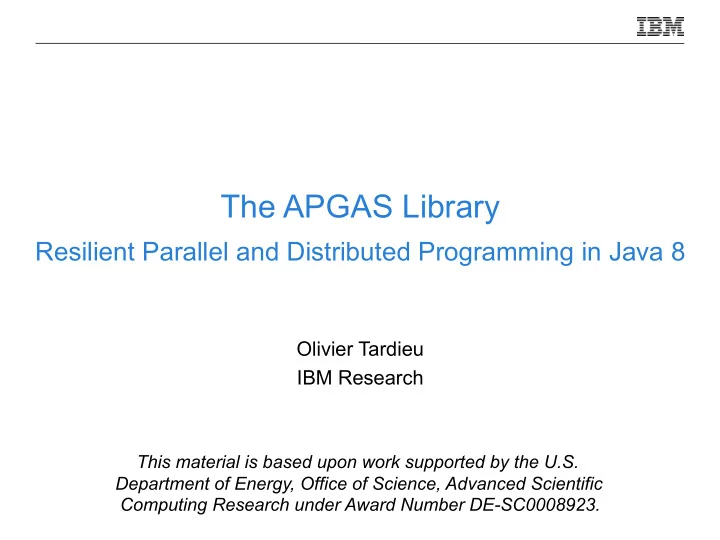

The APGAS Library Resilient Parallel and Distributed Programming in Java 8 Olivier Tardieu IBM Research This material is based upon work supported by the U.S. Department of Energy, Office of Science, Advanced Scientific Computing Research under Award Number DE-SC0008923.
The Equation the X10 language - the language = ??? 2
The Equation the X10 language - the language = the APGAS library 3
Take Away The APGAS library supports § resilient, elastic, parallel, distributed programming on clusters of JVMs § for the Java programmer § for the Scala programmer § as a pure Java library § as an embedded DSL in Scala Compared to X10 § same programming model § places, lightweight tasks, finish, global heap § X10 offers a lot more § syntax, type system, C++/CUDA backend, program analysis and optimization § for a price § new language, 200K LOCs implementation http://x10-lang.org/software/download-apgas/latest-apgas-release.html 4
Outline § API and Examples § Implementation § Experimental evaluation § Roadmap § Demo 5
HelloWorld § X10 finish for (place in Place. places ()) { at(place) async Console. OUT .println("Hello from " + here); } § APGAS import static apgas.Constructs.*; import apgas.Place; finish ( () -> { for (final Place place : places ()) { asyncAt (place, () -> System. out .println("Hello from " + here ()) ); } } ); Java 8 no-arg lambdas imported static methods 6
Compiling and Running § Compile § javac -cp .:apgas.jar HelloWorld.java § Run with one place § java -cp .:apgas.jar:hazelcast.jar HelloWorld § Run with 4 places (single host) § set “apgas.places” system property at launch time § java -Dapgas.places=4 -cp .:apgas.jar:hazelcast.jar HelloWorld § set “apgas.places” system property in main § System.setProperty(Configuration.APGAS_PLACES, "4"); § Configure desired parallelism (typically not required) § set “apgas.threads” property 7
Core API § class Constructs § static void finish(Job f); § static void async(Job f); § static void asyncAt(Place p, SerializableJob f); § static void at(Place p, SerializableJob f); // equivalent to finish async § static <T extends Serializable> T at(Place p, SerializableCallable<T> f); § static Place here(); § static Place place(int id); § static List<? extends Place> places(); § class Place § Place(int id); § int id(); § functional interfaces Job, SerializableJob, SerializableCallable<T> 8
Fibonacci § X10 § APGAS static def fib(n:long) { static long fib(final long n) { if (n<2) return n; if (n<2) return n; val v0:long; val v1:long; final long v[] = new long[2]; finish { finish (() -> { async { v0 = fib (n-2); } async (() -> v[0] = fib (n-2)); v1 = fib (n-1); v[1] = fib (n-1); } }); return v0+v1; return v[0]+v[1]; } } // static def/use analysis // no static analysis // compiles to C++ and Java // Java only // stack-allocated locals (C++) // heap-allocated locals // autoboxing (Java) // explicit boxing 9
Global Heap (PGAS) § GlobalID § globally unique handle § GlobalRef<T> § union of X10’s GlobalRef and PlaceLocalHandle § explicit distributed collection of objects (zero or one per place) § dereferencing a global reference returns the object local to the place (if any) § PlaceLocalObject § implicit distributed collection of objects (zero or one per place) § “scoped static field” § serializing one object in the collection serializes the collection id § deserialization resolves the id to the local object § PlaceLocalArray<T> , PlaceLocalIntArray … 10
Example class Foo extends PlaceLocalObject { int value; public Foo() { value = here ().id + 42; } public static void main(String[] args) { System. setProperty (Configuration. APGAS_PLACES , "2"); final Foo foo = Foo. make ( places (), () -> new Foo()); System. err .println( here () + ": " + foo.value); // place(0): 42 at ( place (1), () -> { System. err .println( here () + ": " + foo.value); // place(1): 43 }); } } 11
Implementation Highlights § Java 8 lambdas § like X10: immutable environment capture, unlike X10: no autoboxing of vars § Java fork/join thread pool and scheduler § APGAS twist: ad hoc thread creation and disposal policies § Java serialization § unlike X10: must implement java.io.Serializable, but type inference for lambdas § APGAS twist: compiler warnings to mitigate runtime serialization exceptions § Hazelcast § fault-tolerant, elastic cluster management § in-memory resilient key value store 2K LOCS § Resilient and non-resilient modes 12
Unbalanced Tree Search § Count nodes in dynamically generated tree § separable cryptographic random number § Representative of a class of irregular applications § computationally intensive § locality insensitive § APGAS implementation follows from X10 § lifeline-based global work-stealing § Configuration § 16 servers § 2 Quad-Core AMD Opteron(tm) Processor 2356 § gigabit ethernet network § 1 APGAS place per server 13
Unbalanced Tree Search 6.50 Million tree nodes/s/worker 6.45 6.39 6.40 6.30 6.25 6.20 6.09 6.10 6.06 6.00 0 16 32 48 64 80 96 112 128 Workers APGAS code Sequential Java code X10 code 14
Roadmap § 1.0 release available today § library and examples § Eclipse integration § Short term § tutorial § cloud integration § Yarn launcher § Scala bindings § Longer term § Spark integration § resilient elastic APGAS § deeper Eclipse integration 15
Fibonacci in Scala APGAS def def fibonacci(i: Int) : Long = { if if(i <= 1 ) i else else { var var a,b = 0L finish finish { async { async a = fibonacci(i – 2) } b = fibonacci(i – 1) } a + b } } 16
Take Away The APGAS library supports § resilient, elastic, parallel, distributed programming on clusters of JVMs § for the Java programmer § for the Scala programmer § as a pure Java library § as an embedded DSL in Scala Compared to X10 § same programming model § places, lightweight tasks, finish, global heap § X10 offers a lot more § syntax, type system, C++/CUDA backend, program analysis and optimization § for a price § new language, 200K LOCs implementation http://x10-lang.org/software/download-apgas/latest-apgas-release.html 17
DEMO
Recommend
More recommend